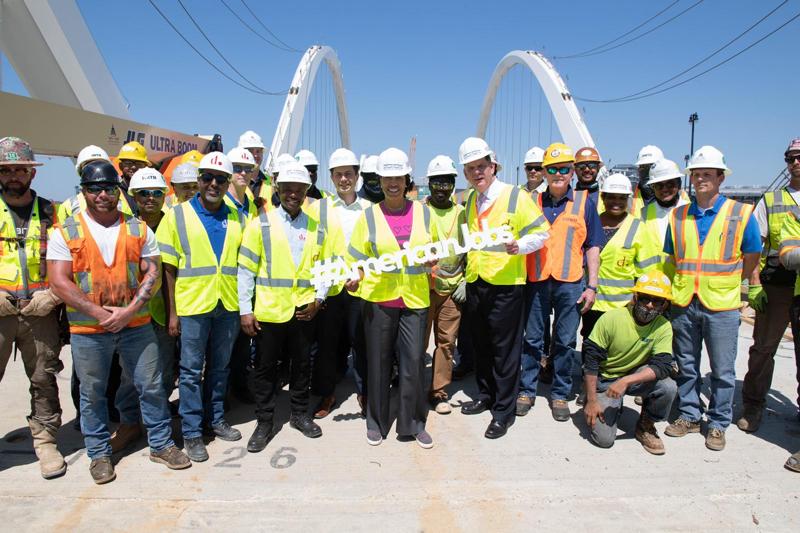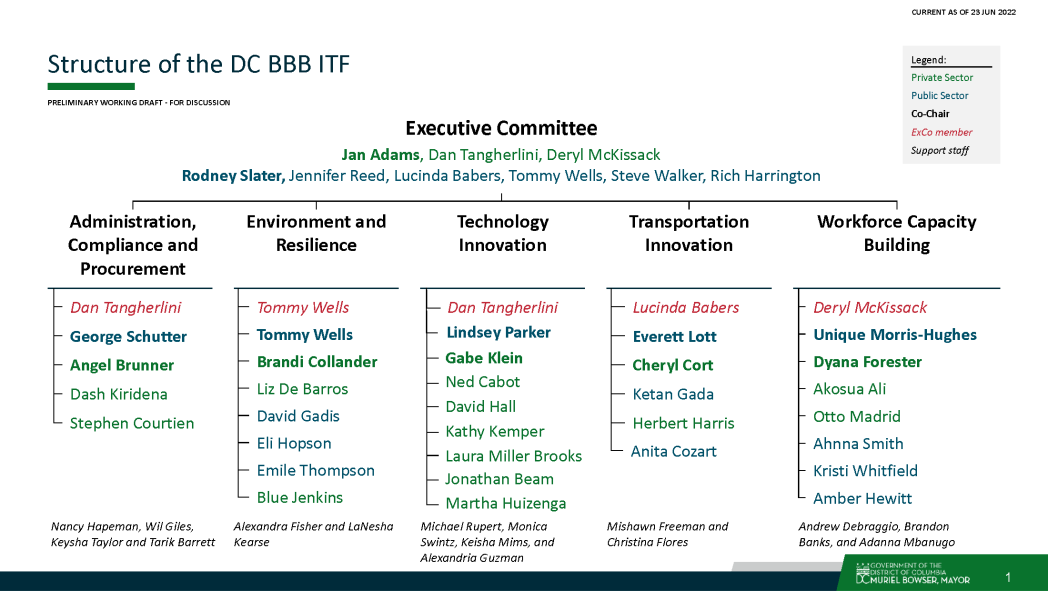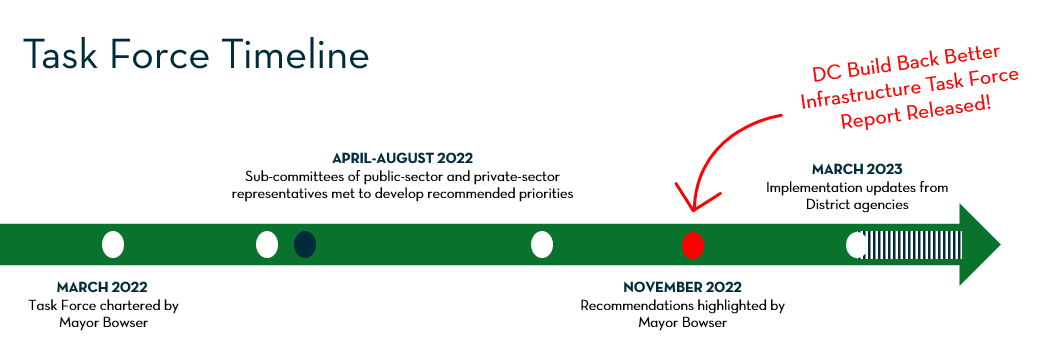
About
On Thursday, March 24, Mayor Muriel Bowser announced the DC Build Back Better Infrastructure Task Force to advise on priority projects to be funded through President Biden’s Bipartisan Infrastructure Law. The $1.2 trillion, five-year infrastructure bill was signed into law on November 15, 2021 and seeks to rebuild American competitiveness through infrastructure by reauthorizing and increasing funding for existing and new programs (over half of the new funding is transportation focused.) The District is expected to receive more than $3 billion over the next five years and will be eligible to apply for competitive grants.
The DC Build Back Better Infrastructure Task Force was responsible for making recommendations on how to maximize this once-in-a-generation funding opportunity to bolster DC’s competitiveness and resiliency in the region, nationally and globally. The Task Force made recommendations on how to prioritize projects that can be funded through the Bipartisan Infrastructure Law, including formula and competitive grants and solicit feedback from the public and external stakeholders.
Subcommittees
The Task Force was made up of members from District agencies and external partners chosen for their expertise in each one of the five subcommittees:
- Transportation Innovation
- Technology Innovation
- Workforce Capacity Building
- Environment and Resilience
- Administration, Compliance and Procurement
There was also an executive committee that reviewed initial committee findings and guided the overall process.
Priority Setting
When thinking about which projects should be prioritized, the Task Force considered recommendations that will improve economic opportunities for underserved communities, create greater equity amongst DC neighborhoods and residents, withstand future shocks and stressors and accommodate growth throughout the District. Project recommendations must meet three core principles:
- Transformational – big, creative ideas that do away with historical barriers and ensure systems and resources are combined to build back better
- Equitable – cement racial equity into all stages of the projects
- Sustainable – address the climate crisis and build resiliency while also being able to continue when BIL funding is no longer available
Structure of the DC BBB ITF
Executive Committee - Jan Adams, Dan Tangherlini, Daryl McKissack, Rodney Slater, Jennifer Reed, Lucinda Babers, Tommy Wells, Steve Walker, Rich Harrington
Administration, Compliance and Procurement - Dan Tangherlini (ExCo member), George Schutter, Angel Brunner, Dash Kiridena, Stephen Courtien (Support staff: Nancy Hapeman, Will Giles, Keysha Taylor and Tarik Barrett)
Environment and Resilience - Tommy Wells (ExCo member), Brandi Collanader, Liz De Barros, David Gadis, Eli Hopson, Emile Thompson, Blue Jenkins (Support staff: Alexandra Fisher and LaNesha Kearse)
Technology Innovation - Dan Tangherlini (ExCo member), Lindsey Parker, Gabe Klein, Ned Cabot, David Hall, Kathy Kemper, Laura Miller Brooks, Jonathan Beam, Martha Huizenga (Support staff: Michael Rupert, Monika Swinz, Keisha Mims and Alexandria Guzman)
Transportation Innovation - Lucinda Babers (ExCo member), Everett Lott, Cheryl Cort, Ketan Gada, Herbert Harris, Anita Cozart (Support staff: Mishawn Freeman and Christina Flores)
Workforce Capacity Building - Daryl McKissack (ExCo member), Unique Morris-Hughes, Dyanna Forester, Otto Madrid, Ahnna Smith, Kristi Whitfield, Amber Hewitt (Support staff: Andrew Debroggio, Brandon Banks and Adanna Mbanugo)

DC Build Back Better Task Force Timeline and Process
Task Force Process
Subcommittes held biweekly internal meetings, community outreach events and field trips. Each of the Subcommittees conducted interactive workshops, field trips and community engagement sessions from May to July of 2022 to translate the Task Force vision into more specific priorities.
The Task Force also commissioned a public survey to solicit input from residents and use the results to inform their proposals. The nearly 700 DC residents who responded prioritized the following goals for infrastructure improvements and investments:
- Mitigate pollution and increase access to clean and renewable energy
- Create strategies to lessen the impact of climate change
- Increase access to public transportation, bike lanes and pedestrian pathways
- Focus improvements to ensure equitable access to tech, communications and systems
Report
On Thursday, November 17, 2023, Mayor Muriel Bowser released the DC Build Back Better Infrastructure Task Force report, which outlines key recommendations for how the District can use the more than $3 billion in funds coming to DC from President Biden’s Bipartisan Infrastructure Law (BIL). The report also provides updates to the public on the task force’s work, including 17 project proposals. The recommendations will guide the District in planning and implementing transformative, equitable, sustainable, and achievable projects.
“When I convened the task force earlier this year, I asked members to think big so that we can continue building a more connected, resilient, and inclusive city,” said Mayor Bowser. “Through President Biden’s Bipartisan Infrastructure Law, we have an opportunity to transform our city and ensure DC is prepared for whatever comes at us in the future. Of course, in neighborhoods across DC, we are already getting dollars out the door, and I want to thank all the people who are working with us – locally, regionally, and at the federal level – to build a safer, stronger, and greener DC.”
